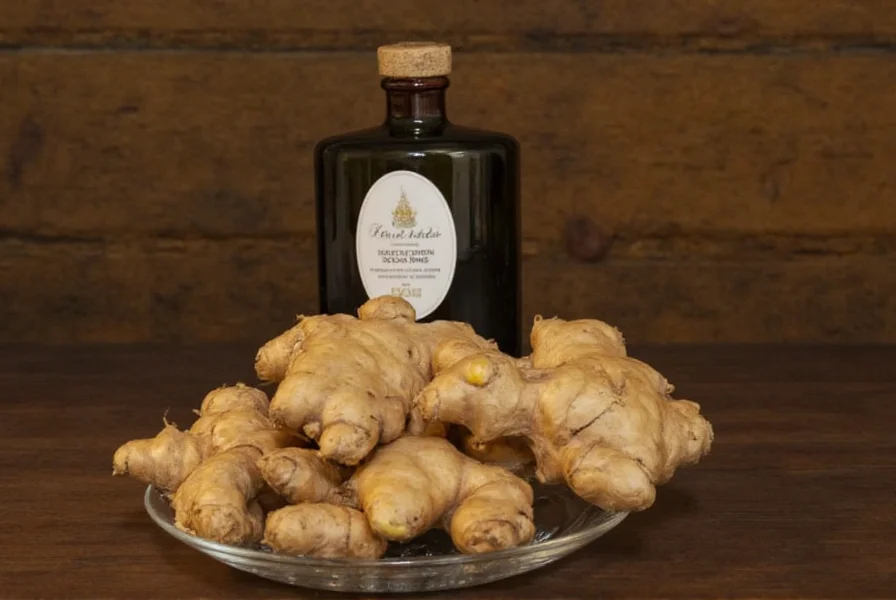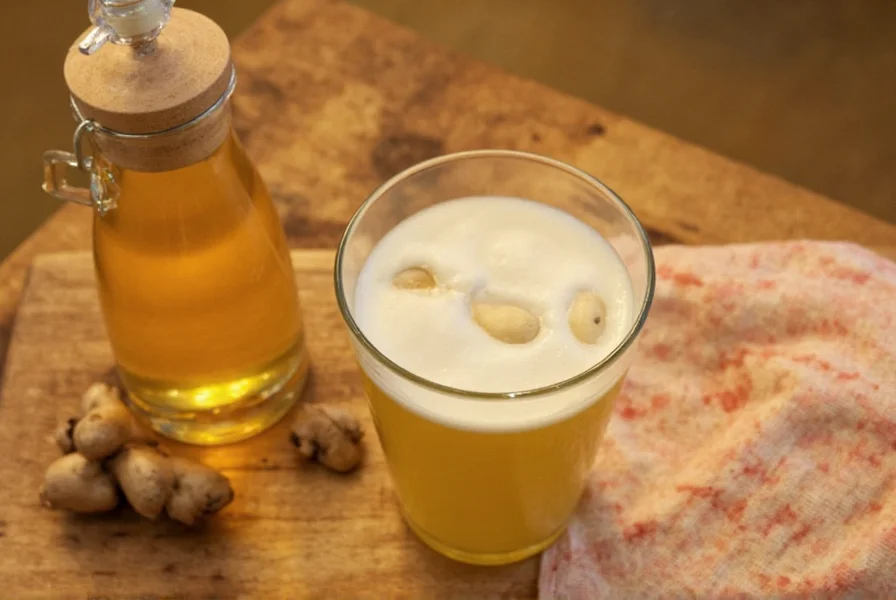Stone ginger wine represents a fascinating intersection of culinary tradition and cultural heritage in East Asian communities. Unlike regular ginger wine, this specialized preparation uses a specific ginger variety known as "stone ginger" (Shi Jiang in Chinese), characterized by its dense, fibrous texture and potent flavor. The preparation process involves carefully selecting mature ginger rhizomes, cleaning and slicing them, then steeping in high-quality rice wine or distilled spirits for several weeks to months.
Understanding Stone Ginger and Its Unique Properties
Stone ginger (Zingiber officinale var. rubrum) differs significantly from common ginger varieties. This particular cultivar develops harder, denser rhizomes with a more intense flavor profile and higher concentration of active compounds. The "stone" designation refers to the ginger's firm texture when mature, which resembles stone in density compared to regular ginger's more fibrous structure.
Traditional growers harvest stone ginger at specific times—typically after 18-24 months of growth—to maximize its distinctive properties. The extended growing period allows for greater accumulation of gingerols and other bioactive compounds that contribute to both flavor and traditional wellness applications.
| Ginger Variety | Growing Period | Texture | Flavor Intensity |
|---|---|---|---|
| Stone Ginger | 18-24 months | Dense, hard | Very strong |
| Common Ginger | 8-10 months | Fibrous, moist | Moderate |
| Young Ginger | 4-6 months | Tender, juicy | Mild |
Traditional Preparation Methods
The authentic preparation of stone ginger wine follows time-honored techniques passed through generations. Traditional stone ginger wine recipe requirements include:
- Organic stone ginger rhizomes (free from pesticides and chemicals)
- High-quality rice wine or distilled spirits (typically 35-45% alcohol)
- Properly sterilized glass or ceramic containers
- Dark, cool storage environment
The preparation process begins with thoroughly washing and air-drying the ginger to remove surface moisture. Traditional practitioners often recommend using unpeeled ginger to preserve maximum flavor compounds. The ginger is then sliced thinly or crushed to increase surface area for better extraction. For every 500ml of alcohol, approximately 100-150g of prepared ginger is used.
After combining ingredients, the mixture undergoes a multi-stage steeping process. Initial steeping occurs at room temperature for 2-4 weeks with regular gentle shaking, followed by a longer maturation period of 3-6 months in a cool, dark place. Some traditional preparations include additional ingredients like goji berries, red dates, or specific herbs depending on regional variations.

Cultural Significance and Traditional Applications
Stone ginger wine holds significant cultural importance across various East Asian communities, particularly in southern China, Taiwan, and parts of Southeast Asia. Its traditional uses span culinary, ceremonial, and wellness applications:
- Culinary applications: Used as a flavor enhancer in braised dishes, marinades, and soups, particularly during colder months
- Postpartum care: Traditionally consumed by new mothers in some cultures as part of postpartum recovery rituals
- Ceremonial use: Featured in certain traditional celebrations and family gatherings
- Household remedy: Used in traditional home care practices for temporary relief of minor discomforts
Understanding stone ginger wine vs regular ginger wine reveals important distinctions. While both use ginger as the primary ingredient, stone ginger wine's unique ginger variety and extended preparation yield a more intense flavor and different compound profile. Regular ginger wine typically uses younger, more common ginger varieties and has a shorter preparation time.
Proper Usage and Storage Guidelines
When incorporating stone ginger wine into culinary applications, proper usage techniques maximize its distinctive qualities. For cooking, add the wine during the early stages of preparation to allow alcohol to evaporate while retaining flavor compounds. In traditional Chinese cuisine, stone ginger wine preparation often includes specific timing for addition to dishes to achieve optimal flavor integration.
For storage, keep stone ginger wine in airtight containers away from light and temperature fluctuations. Properly stored, homemade stone ginger wine maintains quality for 1-2 years, though many traditional practitioners believe flavor continues to develop for up to 3 years. Commercially produced versions typically have a labeled shelf life of 2-3 years when unopened.
Safety Considerations and Responsible Consumption
As with any alcoholic preparation, stone ginger wine contains ethanol and should be consumed responsibly. The alcohol content typically ranges from 20-45% depending on the base spirit used. Individuals with alcohol sensitivities, certain medical conditions, or those taking medications should consult healthcare providers before consumption.
It's important to distinguish between traditional uses and medically proven benefits. While stone ginger wine has been part of cultural traditions for centuries, modern scientific research on its specific health properties remains limited. Consumers should approach traditional preparations with cultural appreciation while maintaining realistic expectations about their effects.

Finding Authentic Stone Ginger Wine
Locating authentic stone ginger wine requires attention to detail. When searching for where to buy authentic stone ginger wine, look for:
- Specialty Asian grocery stores with reputable sources
- Producers who specify the ginger variety used
- Clear labeling of ingredients and alcohol content
- Traditional preparation methods described on packaging
For those interested in homemade preparation, understanding traditional stone ginger wine recipe requirements ensures proper technique. Many cultural communities offer workshops on traditional preparation methods, providing valuable hands-on learning opportunities for those interested in preserving these culinary traditions.
Frequently Asked Questions
What exactly is stone ginger in stone ginger wine?
Stone ginger refers to a specific variety of ginger (Zingiber officinale var. rubrum) that develops exceptionally dense, hard rhizomes after 18-24 months of growth. This variety has a more intense flavor and higher concentration of active compounds compared to regular ginger, which is typically harvested after 8-10 months.
How does stone ginger wine differ from regular ginger wine?
Stone ginger wine uses a specific, mature ginger variety with denser texture and more intense flavor, while regular ginger wine typically uses younger, more common ginger varieties. The preparation process for stone ginger wine often involves longer steeping times (3-6 months versus 1-3 months) and may include additional traditional ingredients depending on regional variations.
Can I make stone ginger wine at home safely?
Yes, you can make stone ginger wine at home following traditional preparation methods. Use organic stone ginger, high-quality rice wine or distilled spirits (35-45% alcohol), and sterilized containers. The process involves washing and slicing the ginger, combining with alcohol at a ratio of 100-150g ginger per 500ml alcohol, and allowing it to steep for 3-6 months in a cool, dark place. Always follow proper food safety practices when preparing homemade alcoholic infusions.
What are the traditional uses of stone ginger wine in Asian cultures?
In traditional East Asian cultures, stone ginger wine has been used for culinary purposes as a flavor enhancer in cooking, in postpartum care rituals, during ceremonial celebrations, and as part of traditional household wellness practices. It's particularly valued for its warming properties and is often consumed during colder months or specific life transitions according to cultural traditions.
How should stone ginger wine be stored for maximum shelf life?
Stone ginger wine should be stored in airtight, dark glass containers away from light and temperature fluctuations. Properly stored homemade stone ginger wine maintains quality for 1-2 years, though flavor may continue developing for up to 3 years. Commercially produced versions typically have a labeled shelf life of 2-3 years when unopened. Once opened, consume within 6-12 months for best quality.











 浙公网安备
33010002000092号
浙公网安备
33010002000092号 浙B2-20120091-4
浙B2-20120091-4